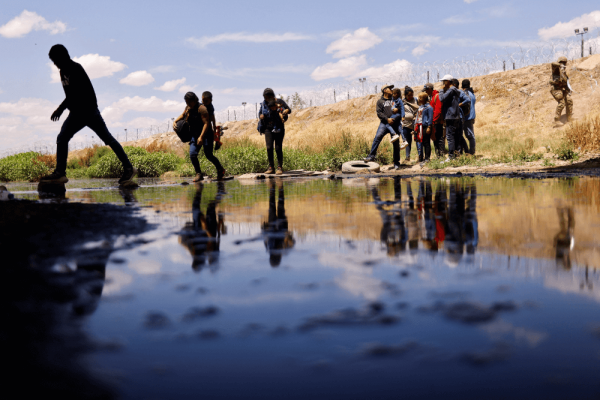Last week, U.S. policy on immigration shifted significantly when the controversial pandemic-related policy known as Title 42 was allowed to expire. At the same time, President Joe Biden issued new restrictions aimed at deterring migrants from making the often-dangerous journey to the border.
Let’s be clear: Neither Title 42 nor Biden’s new policies meet the biblical standard of “welcoming the stranger,” which for us includes thousands of migrants at the U.S.-Mexico border seeking refuge from violence and extreme poverty. Title 42 used the threat of COVID-19 to expel migrants from the U.S. without allowing them to seek asylum — a right they’re entitled to under U.S. and international law. It also exacerbated a massive humanitarian crisis, as migrants deported to Mexico overwhelmed border towns and temporary shelters unprepared to handle the influx. Under the new policies, families and children can apply for asylum if they get to the U.S. Adults, however, will only be eligible for asylum if they have first sought asylum in other countries they entered en route to the U.S. or use an app to secure an appointment at a border crossing ahead of time — neither of which are easy for folks in the chaos of fleeing their home country.
But while it’s easy to point out where these policies fall short, it’s often harder to suggest alternatives. After decades of congressional failure to pass comprehensive immigration reform and deliberate efforts by the former Trump administration to dismantle the system, we’re left with an immigration system that is fundamentally broken. We don’t have enough judges or aid workers to process asylum claims and we don’t have enough shelters where migrants can wait while their asylum claims are processed. Nonprofits like the Red Cross, and faith-based organization like Catholic Charities and Church World Service, provide vital services to fill many of these gaps, but these groups cannot meet all the needs of the migrants at their doors.
The result of all this is an estimated backlog of 2 million cases and yearslong delays. When you combine an overburdened system with a record number of new migrants seeking asylum, you get the current crisis, which can easily feel intractable. What does Jesus call us to do in a moment like this?
First and foremost, I believe Jesus always calls us to protect the inherent dignity of migrants. He would recognize that migrants are trapped between multiple humanitarian crises: The crises of war, poverty, environmental destruction, and other factors that drive migrants to flee as well as the dangerous and inhumane conditions they face when they arrive (or are deported to) to border towns. (And I suspect that Jesus might tell a sharp parable pointing out that decades of failed U.S. foreign policy in Central America and beyond means the U.S. is complicit in many of the conditions that drive migrants to leave their countries.)
When I think about what Jesus would be doing in a crowded shelter in a border town, I imagine him doing what so many faith-based organizations and congregations are doing: stepping in to provide immediate care, support, and safety. When we recognize the dual humanitarian crises migrants face, we should treat migrants not as criminals but as image bearers who deserve dignity.
So often in our debate about immigration, this biblical call to welcome the “stranger” or “migrant” is pitted against those who advocate for “tough on crime,” “follow the rule of law” policies. But this is a false binary: We can both find better ways to prevent criminal border crossings — including the smuggling of fentanyl and other drugs — while also being clear that the majority of migrants are seeking to exercise their legal right to petition for asylum. Pretending that we have to choose one or the other only exacerbates fierce political divisions and keeps us from building a humane and effective immigration system.
Some actions taken by the Biden administration have been important steps toward treating migrant people with more dignity than the previous administration, including fortifying the Deferred Action for Childhood Arrivals program, expanding humanitarian protection through Temporary Protected Status (TPS), reducing the number of interior deportations, increasing alternatives to detention, and beginning to strengthen the immigration court infrastructure to address the extreme backlog. These are good first steps, but to protect the dignity of migrants, we must urge that these efforts continue and be scaled up — and quickly!
In a moment like this, I also can’t help but imagine that Jesus would have some sharp words for the Republican politicians who have relentlessly stoked xenophobic sentiments among their voters, including through the cruel stunt of busing migrant people thousands of miles from the border, treating migrants like pawns in a political game. Echoing the words of Matthew 25, I imagine Jesus saying something like, “Woe to you legislators that demonize and dehumanize people who are seeking safety and a better life, just as you mistreat them, you mistreat me.”
Finally, when I think about following Jesus in a moment like this, I know we need to confront the grim reality that the system will remain hopelessly broken until Congress passes comprehensive immigration reform legislation. Yes, our churches and faith-based organizations can — and should! — take steps to help meet the immediate needs of migrants, including volunteering to care for migrants while they await their proceedings or welcoming the migrants who’ve been bused to their city. But while politics focuses on what’s possible, our faith enables us to envision new realities that transcend the brokenness of what is.
Our faith demands that we imagine a new immigration system, a new reality in which many of the root causes of migration such as extreme poverty, violence, and conflict are redressed. As Vanessa Martinez Soltero, who leads Sojourners’ immigration work, shared with me: “It is important to recognize and grieve the irreparable damage policies like Title 42 have already done to our migrant siblings, but we must also hold steadfast on what can and should be repaired moving forward. As the church in the U.S., let us amplify the voices of migrants and speak up for immigration policies that protect the life and dignity of those who knock at our nation’s doorstep seeking safety and freedom.” Can we imagine together shelters that provide humane and safe refuge for those seeking asylum and a system that treats migrants with dignity at every step of the process? A new immigration system that prioritizes the dignity of migrants is possible; let’s work to make it so.
Got something to say about what you're reading? We value your feedback!







